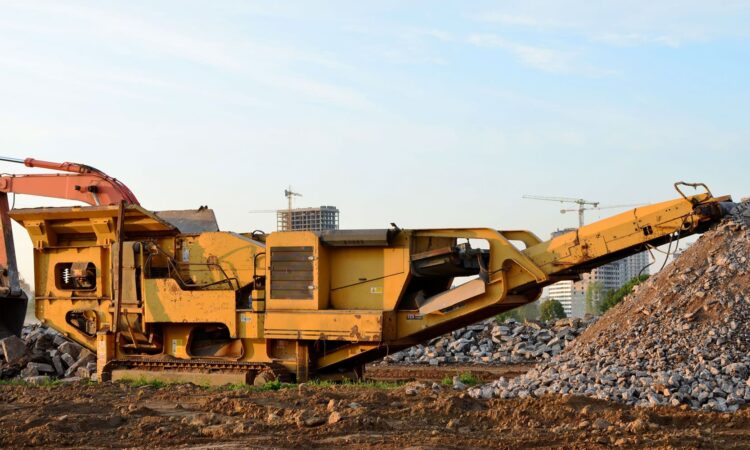
In industries like mining, construction, agriculture, and landscaping, rock screens are essential tools. They are used to separate rocks, gravel, and debris from finer materials such as sand, soil, or crushed stone. Whether you’re working on a large-scale commercial project or a small residential one, purchasing the right rock screen can greatly affect your productivity and the quality of your output. This article will guide you through the key considerations you should keep in mind when searching for the best rock screen for sale.
What Is a Rock Screen?
A rock screen, sometimes called a soil screener or gravel separator, is designed to sift out unwanted materials and debris from finer substances. The screen works by allowing smaller particles to fall through the mesh while retaining larger debris like stones or rocks. This ensures the material you’re left with is clean and ready for further processing or use.
Key Factors to Consider When Buying a Rock Screen
When you’re in the market for a rock screen for sale, it’s crucial to evaluate different factors that will impact the machine’s performance and longevity. Here are some key considerations to keep in mind:
1. Type of Rock Screen
There are several types of rock screens, each designed for different purposes and scales of operation. Understanding the differences will help you choose the one that best fits your project:
- Static Screens: These are stationary screens that rely on gravity to separate materials. They are simple in design, less expensive, and ideal for smaller projects where the material flow is less demanding.
- Vibrating Screens: These screens use vibration to help in the separation process. They are highly efficient, particularly in large-scale operations, and are capable of handling high volumes of material. Vibrating screens are often used in industries that require continuous screening with minimal manual input.
- Trommel Screens: A trommel screen consists of a rotating cylindrical drum that sifts materials based on their size. It is particularly effective for screening larger quantities of materials, especially in mining or heavy-duty landscaping projects.
- Grizzly Screens: These screens are built with parallel bars that allow smaller materials to fall through while holding back larger rocks and debris. Grizzly screens are perfect for tough conditions and are commonly used for screening larger rocks and heavy materials.
Choosing the right type will depend on the scale of your project, the type of materials you’re working with, and how often you expect to use the screen.
2. Size and Capacity
The size and capacity of the rock screen you purchase should be in line with the scale of your operation. If you’re working with a small amount of material, a compact screen will suffice. However, if you’re dealing with large quantities, you’ll need a larger screen to keep up with the demand:
- Screen Size: This refers to the physical dimensions of the screening area. Larger screens can process more material at once, making them ideal for industrial or commercial projects. On the other hand, a smaller screen is more suitable for DIY or smaller-scale projects.
- Capacity: The capacity of a rock screen is typically measured in tons or cubic yards of material it can process per hour. Be sure to choose a screen that matches the volume of material you’ll be working with to avoid bottlenecks in your workflow.
3. Durability and Material Quality
When looking for a rock screen for sale, durability is a key factor. Rock screens are subjected to rough, abrasive materials, and a poorly made screen won’t last long in such harsh conditions. Consider the following:
- Construction Material: The screen’s frame and mesh should be made from high-quality materials, such as steel or reinforced metal alloys. These materials can handle wear and tear and resist corrosion, ensuring that the screen has a long operational life.
- Mesh Strength: The mesh should be made from high-tensile wire or steel to withstand constant friction and impact from rocks and other materials.
- Weld Quality: Look for strong, seamless welds in the screen frame, as weak welding can lead to premature failure, especially under heavy loads.
4. Portability and Ease of Setup
Depending on the nature of your work, you may need a portable rock screen, especially if your worksite changes frequently. Here are two common options:
- Stationary Rock Screens: These are installed in a fixed location and are typically more robust. They are best for large operations where mobility is not required.
- Portable Rock Screens: If you need flexibility, look for a mobile screen. Many portable units come equipped with wheels or can be mounted on trailers, making them easier to move from one site to another.
In some cases, ease of setup and takedown can be a critical factor, especially for smaller contractors or DIY enthusiasts.
5. Screening Efficiency
Efficiency is a critical consideration when choosing a rock screen. The more efficiently a screen works, the faster you can get through material and the less downtime you will experience. Factors affecting screening efficiency include:
- Mesh Size: Different screens come with different mesh sizes. Smaller mesh sizes allow finer particles to pass through, while larger mesh sizes allow bigger materials. Some screens offer adjustable or replaceable mesh, which allows you to customize the screen depending on the material you need to process.
- Screen Incline: A steeper incline can improve the speed of material processing, but may reduce the accuracy of separation. On the other hand, a shallower incline may be slower but will provide more thorough sorting.
- Vibration Frequency: For vibrating screens, you may need to adjust the vibration intensity to suit different materials. Make sure the screen you choose allows for this adjustment, ensuring that you can screen a variety of materials efficiently.
6. Maintenance and Cost of Ownership
In addition to the purchase price, you should also consider the long-term costs of owning and maintaining a rock screen. Here are a few things to keep in mind:
- Initial Cost: The price range for rock screens varies depending on their size, type, and features. It’s important to balance the initial cost with the specific needs of your project.
- Maintenance Requirements: High-quality rock screens may require less frequent maintenance, saving you both time and money in the long run. Check the availability of replacement parts and ease of maintenance before making your decision.
- Resale Value: Some rock screens hold their value better than others. If you plan on upgrading or selling the unit later, consider how much you can potentially get back by reselling it.
7. Supplier Reputation and Support
When purchasing a rock screen for sale, it’s important to buy from a reputable supplier. A reliable supplier will provide you with quality equipment, solid warranties, and excellent customer support. Here’s what to look for:
- Customer Reviews: Check online reviews or ask for recommendations to ensure that you are dealing with a trustworthy supplier.
- Warranty and Support: A strong warranty gives you peace of mind. Make sure the rock screen comes with a comprehensive warranty covering both the frame and mesh.
- After-Sales Service: Excellent customer support is vital in case you need help with installation, maintenance, or repairs.
Conclusion
When looking for a rock screen for sale, it’s essential to consider various factors that will impact the equipment’s performance, durability, and efficiency. From the type of screen and its capacity to its durability, portability, and cost, every aspect plays a role in ensuring that the rock screen you purchase will meet your project’s specific needs. By understanding these key considerations, you’ll be well-equipped to make a smart investment that will provide lasting value for your business or project.
